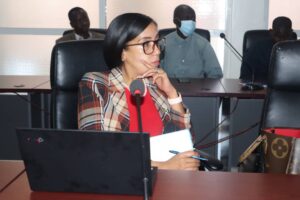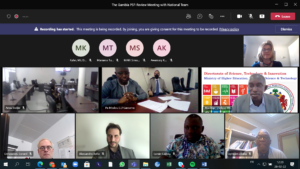Key policy recommendations on how to set up an efficient National Innovation Fund, to accelerate The Gambia’s transition to an innovation-led and knowledge-based economy, were presented during the final event of the OACPS R&I Policy Support Facility service in the Gambia.
Held in a hybrid mode (in Banjul and online)on 28 February 2022, the closing event of the OACPS R&I Policy Support Facility (PSF) service in The Gambia was attended by around 50 key national and international stakeholders, representing various ministries, institutions and universities in The Gambia, the Secretariat of the Organisation of African, Caribbean and Pacific States (OACPS), and the European Union.
The Ministry of Higher Education, Research, Science and Technology (MoHERST) of the Gambia, through its Directorate of Science, Technology & Innovation, requested the support of the OACPS Secretariat towards the development of a step-by-step guide on how to establish the National Innovation Fund (NIF), how to mobilise resources, and effectively manage it.
The Expert Panel, in charge for the delivery of this PSF service, carried out this Policy Recommendation Report (PRR) between July 2021 and February 2022.
A Country Background Report (baseline information, existing practices, SWOT analysis) developed by two other independent experts, provided key insights about the national R&I system and its main challenges, paving the way for the elaboration of the PRR.

(Ms Awamary Lowe-Khan, Chair of the PSF Expert Panel)
In her presentation, Ms Awamary Lowe-Khan, Chair of the PSF Expert Panel, summarized the key policy recommendations:
- The NIF should be implemented and launched officially in 2022.
- The Gambian government should determine an annual flexible allocation for funding the NIF, leveraged by other national and international organisations and the private sector.
- The MoHERST should lead in initiating an ambitious national program that involves all incubators and accelerators to induce a dynamic force of innovation in partnership with stakeholders of the NIF, putting due diligence on priority and potential sectors, and impactful projects.
- In promoting the NIF, the government should enhance information flow across all sectors, in order to spur demand-led innovation activities and further encourage collaboration among universities, the public and private sector actors, and civil society.
- The government should increase national and international collaboration to boost the NIF.
- It should also encourage continuous learning from other countries, such as Botswana, Mozambique, Rwanda and South Africa
Speaking on behalf of the Assistant Secretary General of the OACPS Secretariat, Dr. Norbert Richard Ibrahim, Mr. Gerard Denouden, from the OACPS R&I Programme TAU team- expressed the conviction that “the establishment of the National Innovation Fund will contribute to create a conducive R&I environment and assist the country in becoming a land of innovation, thereby strengthening business innovation potential and facilitating the transfer of knowledge, and university – industry linkages.”

In his intervention, Mr. Ridwane Abdul Rahman, Programme Manager at the European Union Delegation to The Gambia, also pointed out the importance of “ownership and willingness to make investments available for the creation of the National Innovation Fund”, (…) an enabler to address one of the main challenges that the Gambian innovation system is facing: difficult access to funding. The Innovation Fund will promote financial incentives such as tax breaks, soft financing and other tools that can really boost innovation activity in the country (…) and help leverage more private public partnerships to pull off innovative and impactful solutions for national development”.
MoHERST has already committed fund for setting the NIF up. Speaking on behalf of Hon. Badara A Joof, Minister of the MoHERST, its Permanent Secretary Hon. Mod A.K Secka concluded the final event, by underlining the urgency of having the NIF operational: “The issue of the creation of a national innovation fund is something that should have happened yesterday. The reason why I am saying this is because the funding landscape in this country is seriously constrained to the extent that access to funding for our productive sectors is a big challenge. This is because the interest rates are exorbitantly high. They require most of the time collaterals to access these funds(…). So the timing could not have been better. (…) I think the journey is just beginning with the preparation of this recommendation policy document. “
The Gambian government now has two key documents, the Country Background Report and the Policy Recommendation Report (soon to be published) to help it set up and manage the NIF.
This final event of the PSF service marks an important milestone for the OEACP Secretariat in its efforts to support the improvement of ACP countries’ R&I systems. Launched in January 2021, the Policy Support Facility is one of the components of the OACPS Research and Innovation Programme, implemented by the Organisation of African, Caribbean and Pacific States (OACPS) and funded by the European Union (EU) to unlock innovation potential in the 79 OACPS member countries.
